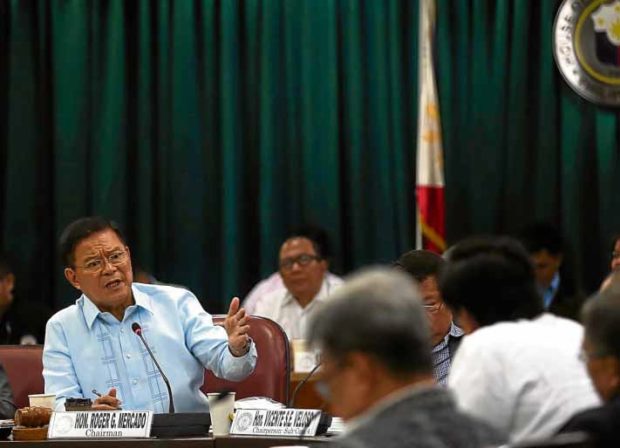House committee leader claims federalism will prevent dictatorship

Rep. Roger Mercado, chair of the House committee on constitutional amendments, on Tuesday, Jan. 16, 2018, led discussions on the proposed revisions to the 1987 Constitution. (Photo by LYN RILLON / Philippine Daily Inquirer)
Federalism could prevent the repeat of the Marcos dictatorship by “dispersing” executive power, according to Southern Leyte Rep. Roger Mercado, chairman of the House of Representatives’ constitutional amendments committee.
In a statement issued on Sunday, Mercado said: “A federal constitution will precisely give even more safeguards against dictatorship because of the dispersal or sharing of executive power, by dismantling the vestiges of Imperial Manila.”
“A dictatorship ended in 1986. We are not going to let that part of our history repeat itself,” he added.
Mercado acknowledged concerns that a federal system of government – which entails the creation of states to which various national government responsibilities are devolved – could be abused by political dynasties to prolong their rule.
Yet, he just left it up to the “critics” to “propose solutions, present alternatives, raise options,” because “it is not enough that critics oppose.”
Article continues after this advertisementMercado said the critics should propose how to “convince nontraditional candidates to venture into politics and public service.”
Article continues after this advertisementMeanwhile, Leyte 3rd Dist. Rep. Vicente Veloso, the committee vice chairperson and a former Court of Appeals justice, floated the possibility that the Senate’s lawmaking power might be removed under the new federal Constitution.
In an interview with radio station dzBB, Veloso suggested the Senate should focus only on confirming Cabinet appointees, ratifying treaties – and being a “training ground” for presidential aspirants.
This would leave the creation of laws and the power of the purse to district representatives under the so-called Federal Assembly, the equivalent of what is now the House.
“The law-making should not be duplicitous because that’s not pretty,” Veloso said.
He added that more people “do not seem to like the Senate, especially with what is happening now,” amid an escalating dispute whether the 292-member House and the 23-member Senate should convene jointly into a Constituent Assembly to amend the Constitution.
“They are too insecure, because they do not want to vote separately,” Veloso said.
The mother committee is currently tackling the proposed amendments submitted by its several subcommittees.
The subcommittee tackling the provisions on the government setup, chaired by Davao Oriental 1st Dist. Rep. Corazon Nuñez-Malanyaon, proposed that each federal state be allocated three seats in the Senate, although it had not elaborated on the chamber’s functions under the federal-parliamentary setup. /atm